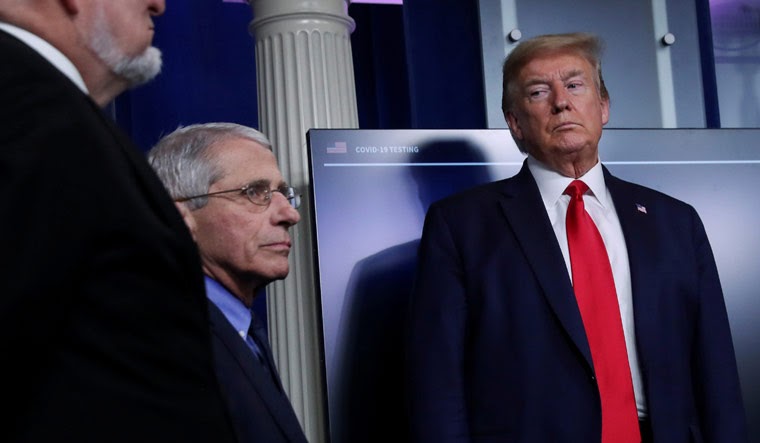Trump attacks Dr. Anthony Fauci
President Donald Trump looks over at National Institute of Allergy and Infectious Diseases Director Dr. Anthony Fauci as CDC Director Robert Redfield looks on the president returning to the daily coronavirus task force briefing at the White House in Washington, U.S., April 17, 2020
On Oct. 19, Donald Trump attacked Dr. Anthony S. Fauci, the leading infectious disease specialist in the country, labelling him as “a disaster” in a call to his campaign staff.
The President claims that the general public is “tired” of hearing about the virus by “these idiots,” the ones “who got it wrong,” referring to Fauci and other leading career government scientists and the way they’ve dealt with the spreading pandemic.
Trump’s aides and closest compatriots worry about his blatant verbal assaults against the widely trusted and particularly qualified Fauci, who has notably worked under and advised six presidents, so close to Election Day. According to the Greensboro News and Record, “his attacks on experts like Fauci could undermine his final efforts to appeal to voters outside his most loyal base,” which is cause for concern for Trump and his supporters.
Department Chair and Professor of Political Science at Guilford College George Guo worries that Trump’s “Attacks against Fauci may help Trump shirk his responsibility” by using Fauci as a scapegoat for his own negligence surrounding the virus.
Trump has unexpectedly drawn copious amounts of worry from Senate Republicans, fearing that his harsh stance against Fauci is also far too polarizing to win more bipartisan voters in swing states especially, The Washington Post informs us.
Even Senate Majority Leader Mitch McConnell refused to add onto the President’s disparagement of Fauci, expressing his concerns about the rising rates of the virus in his home state of Kentucky and simply proposing the basic message of, “the one thing we all need to do is wear a mask, practice social distancing, try to prevent the spread.”
McConnell also surprisingly said that “the only thing each of us can do, until we get a vaccine, is act as responsibly as possible,” taking on a much more objective approach to the realities of the pandemic than his fellow Republican, Trump.
In terms of what Fauci thinks of the president, he himself told all in his “60 Minutes” interview on CBS Sunday (Oct. 18). Fauci was completely unsurprised of the President’s contraction of the virus and was “worried that he was going to get sick when I saw him in a completely precarious situation of crowded, no separation between people, and almost nobody wearing a mask.”
Fauci has been continually furthering himself from Trump and the White House, cautioning the American public to “hunker down” for the impending brutal winter, as temperatures drop. The doctor’s informative warning is in complete opposition with Trump’s nonchalant claims that the country is in fact “rounding the corner” on the virus that has killed 220,000 Americans.
Fauci is resistant to the idea that the country is currently in a second wave, stating “we have never completely gotten out of the first wave.”
Guo also explains the outcome of the virus’ over politicization and Trump turning a blind eye to science: “The U.S. has suffered greatly due to the pandemic being politicized and refusal to respect science.”
Trump even went as far as using Fauci to disparage his presidential opponent during a speech in Prescott, Arizona. He stated, in an attempt to disparage, that Biden “wants to listen to Dr. Fauci,” demonstrating his negative opinion of Dr. Fauci.
As we face the growing pandemic, the President avoidantly blames China for the start and spread of COVID-19 within the United States. “It’s not my fault that it came here,” he says. “It’s China’s.”
Trump coolly denies his part in the escalation of the virus; a true disservice to the nation and to the 220,000 lives already lost.
We are living in a time where proper rational decision making in the Executive Office is clouded by partisan disputes. This lack of transparency could mean the difference between life or death for thousands, if not millions, of Americans.












belle • Oct 29, 2020 at 10:36 pm
Claire, yet another amazing article! Thanks for showing both what Trump and Fauci have been saying. Can’t wait for your next article!